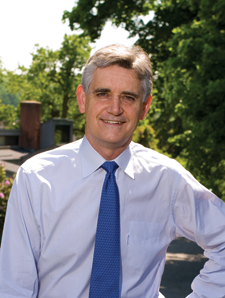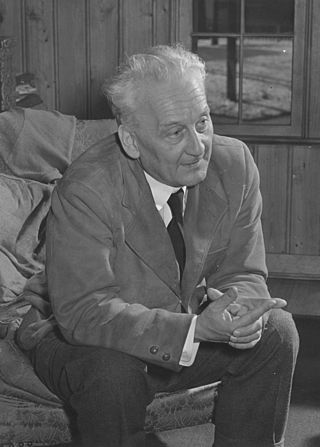
Beth Israel Deaconess Medical Center (BIDMC) in Boston, Massachusetts is a teaching hospital of Harvard Medical School. It was formed out of the 1996 merger of Beth Israel Hospital and New England Deaconess Hospital. Among independent teaching hospitals, Beth Israel Deaconess Medical Center consistently ranks in the top three recipients of biomedical research funding from the National Institutes of Health. Research funding totals nearly $200 million annually. BIDMC researchers run more than 850 active sponsored projects and 200 clinical trials. The Harvard-Thorndike General Clinical Research Center, the oldest clinical research laboratory in the United States, has been located on this site since 1973.

Mario Ramberg Capecchi is an Italian-born molecular geneticist and a co-awardee of the 2007 Nobel Prize in Physiology or Medicine for discovering a method to create mice in which a specific gene is turned off, known as knockout mice. He shared the prize with Martin Evans and Oliver Smithies. He is currently Distinguished Professor of Human Genetics and Biology at the University of Utah School of Medicine.

The Eli and Edythe L. Broad Institute of MIT and Harvard, often referred to as the Broad Institute, is a biomedical and genomic research center located in Cambridge, Massachusetts, United States. The institute is independently governed and supported as a 501(c)(3) nonprofit research organization under the name Broad Institute Inc., and it partners with the Massachusetts Institute of Technology, Harvard University, and the five Harvard teaching hospitals.

Mark Ptashne is a molecular biologist. He is the Ludwig Chair of Molecular Biology at Memorial Sloan–Kettering Cancer Center in New York City.
Robert E. Wittes was Physician-in-Chief of Memorial Sloan-Kettering Cancer Center, from 2002 until December 31, 2012. Prior to his appointment at MSKCC, he was Deputy Director for Extramural Sciences and Director of the Division of Cancer Treatment and Diagnosis at the National Cancer Institute, where he oversaw NCI's extramural clinical and basic research programs, including the evaluation of new therapeutics, diagnostics, and translational research. Wittes is a fellow of the American College of Physicians, a member of the American Association for Cancer Research, the American Society of Clinical Oncology, and the American Federation for Medical Research. In addition to his institutional affiliations, Dr. Wittes has served as editor-in-chief of the Journal of the National Cancer Institute and Oncology. He has served on the editorial boards of Clinical Cancer Research, Current Opinion in Oncology, The American Journal of Clinical Oncology; Cancer Investigation, and The International Journal of Radiation Oncology-Biology & Physics, among others.
Thomas J. Kelly is an American cancer researcher whose work focuses on the molecular mechanisms of DNA replication. Kelly is director of the Sloan-Kettering Institute, the basic research arm of the Memorial Sloan-Kettering Cancer Center. He holds the Center's Benno C. Schmidt Chair of Cancer Research.
Simon N. Powell is a British cancer researcher and radiation oncologist residing in New York City.

Bruce William Stillman, AO, FAA, FRS is a biochemist and cancer researcher who has served as the Director of Cold Spring Harbor Laboratory (CSHL) since 1994 and President since 2003. He also served as the Director of its NCI-designated Cancer Center for 25 years from 1992 to 2016. During his leadership, CSHL has been ranked as the No. 1 institution in molecular biology and genetics research by Thomson Reuters. Stillman's research focuses on how chromosomes are duplicated in human cells and in yeast Saccharomyces cerevisiae; the mechanisms that ensure accurate inheritance of genetic material from one generation to the next; and how missteps in this process lead to cancer. For his accomplishments, Stillman has received numerous awards, including the Alfred P. Sloan, Jr. Prize in 2004 and the 2010 Louisa Gross Horwitz Prize, both of which he shared with Thomas J. Kelly of Memorial Sloan-Kettering Cancer Center, as well as the 2019 Canada Gairdner International Award for biomedical research, which he shared with John Diffley.
Michael B. Yaffe is an American scientist, professor, surgeon, and retired U.S. Army Reserve Medical Corps Colonel. He is currently the David H. Koch Professor of Biology & Biological Engineering at MIT and a trauma surgeon at the Beth Israel Deaconess Medical Center. In 2016, the United States Army awarded him the Bronze Star Medal for his services as a trauma surgeon on active duty in Afghanistan. He also treated many of the victims of the Boston Marathon bombing.

The Szent-Györgyi Prize for Progress in Cancer Research, established by National Foundation for Cancer Research (NFCR) and named in honor of Albert Szent-Györgyi, Nobel laureate and co-founder of NFCR, has been awarded annually since 2006 to outstanding researchers whose scientific achievements have expanded the understanding of cancer and whose vision has moved cancer research in new directions. The Szent-Györgyi Prize honors researchers whose discoveries have made possible new approaches to preventing, diagnosing and/or treating cancer. The Prize recipient is honored at a formal dinner and award ceremony and receives a $25,000 cash prize. In addition, the recipient leads the next "Szent-Györgyi Prize Committee" as honorary chairman.

Kenneth Offit is an American cancer geneticist and oncologist. He is currently Chief of the Clinical Genetics Service and the Robert and Kate Niehaus Chair in Inherited Cancer Genomics at Memorial Sloan Kettering Cancer Center. Offit is also a member of the Program in Cancer Biology and Genetics at the Sloan-Kettering Institute, Professor of Medicine and Healthcare Policy and Research at Weill Cornell Medical College, and a member of both the Board of Scientific Counselors of the National Cancer Institute and the Evaluation of Genomic Applications in Practice and Prevention working group of the U.S. Centers for Disease Control.

Paul Talalay was the John Jacob Abel Distinguished Service Professor of Pharmacology and director of the Laboratory for Molecular Sciences at the Johns Hopkins School of Medicine in Baltimore. He was the founder of the Brassica Chemoprotection Laboratory for the study of edible plants that induce protective enzyme activity in the body and may help prevent the development of cancer.
Marcel R.M. van den Brink is a Dutch oncologist and researcher at Memorial Sloan Kettering Cancer Center known for his research in hematopoietic stem cell transplantation for cancer patients.
Nathanael S. Gray is a Krishnan-Shah Family Professor of chemical and systems biology at Stanford University and director of cancer therapeutics programme at Stanford University School of Medicine. Previously he was a Nancy Lurie Marks Professor of biological chemistry and molecular pharmacology at Harvard Medical School and professor of cancer biology at Dana–Farber Cancer Institute. Gray is also co-founder, science advisory board member (SAB) and equity holder in C4 Therapeutics, Gatekeeper, Syros, Petra, B2S, Aduro, Jengu, Allorion, Inception Therapeutics, and Soltego. C4 Therapeutics, which offered IPO in 2020, was founded based on the ground-breaking research of Jay Bradner, current president of Novartis Institutes for BioMedical Research (NIBR), and of Nathanael S. Gray, while he was professor at Harvard Medical School. Before moving to Stanford University, Nathanael S. Gray created Center for Protein Degradation at Harvard Medical School with $80 million agreement with Deerfield Management venture capital firm. In 2020, Gray Lab permanently moved to Stanford University, that was stated by Stuart Schreiber, co-founder of Broad Institute as "Stanford's huge gain".

Scott William Lowe is Chair of the Cancer Biology and Genetics Program in the Sloan Kettering Institute at Memorial Sloan Kettering Cancer Center. He is recognized for his research on the tumor suppressor gene, p53, which is mutated in nearly half of cancers.
Gregory James Hannon is a professor of molecular cancer biology and director of the Cancer Research UK Cambridge Institute at the University of Cambridge. He is a Fellow of Trinity College, Cambridge while also serving as a director of cancer genomics at the New York Genome Center and an adjunct professor at Cold Spring Harbor Laboratory.
Charis Eng, M.D., Ph.D., is a Singapore-born physician-scientist and geneticist at the Cleveland Clinic, notable for identifying the PTEN gene. She is the Chairwoman and founding Director of the Genomic Medicine Institute of the Cleveland Clinic, founding Director and attending clinical cancer geneticist of the institute’s clinical component, the Center for Personalized Genetic Healthcare, and Professor and Vice Chairwoman of the Department of Genetics and Genome Sciences at Case Western Reserve University School of Medicine.

Samuel J. Lin is an associate professor of surgery at Harvard Medical School and a plastic surgeon at Beth Israel Deaconess Medical Center. He is also the Program Director for the BIDMC/Harvard Plastic Surgery Residency Training Program and Co-Fellowship Director for the Aesthetic and Reconstructive Fellowship Program.
Lydia W. S. Finley is an American scientist and an assistant member at the Cell Biology Program at Memorial Sloan Kettering Cancer Center and an assistant professor at Weill Cornell Medical College. Finley is known for her contributions to understanding the metabolic underpinnings of stem cell fate.
Kathryn T. Hall is a leader in public health, professor of medicine and molecular biologist who directs research or teaches at several institutions, including the following:










